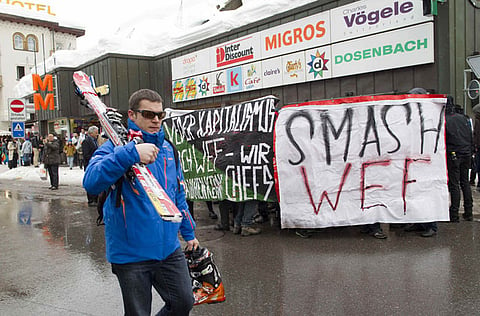Tolerance discourse highlights issues economists often miss
The final day of the annual meeting has an end-of-term feeling. Some people are dashing about finding time to make those meetings which they had managed to miss up until now

The final day of the annual meeting has an end-of-term feeling. Some people are dashing about finding time to make those meetings which they had managed to miss up until now. And others are slipping out of the sessions, muttering about finding time for a few hours on the ski slopes.
None of that for me: I went to a fascinating session on how to overcome religious tensions in Eur-ope that was held outside the Congress Centre and was open to the public. Having been in the rarified setting of the World Economic Forum for four days, it was great to see the crowded session, full of young people from the general public, who wanted to listen and take part. It was an important reminder that the high-level conversations going on in the Congress Centre play out to the millions of people around the world.
Espen Barth Eide, the defence minister of Norway, described the national horror at the massacre committed by one individual, and how the entire Norwegian people united to show that one act of terror would not fling them off their chosen path. After the killing, they made a point of cherishing their multicultural society based on the European ideals of the Enlightenment.
Insistence on freedom
The discussion of how several religions can flourish together in Eur-ope centred on how to promote mutual tolerance, especially when two fundamental freedoms clash. The answer to this conundrum has to come from both insisting on freedoms to act but also insisting on not being offended by others' actions.
Call to organisations
Shadi Hamid of Brookings in Qatar spelt this out when he said that acceptance and insistence on freedom was the key: freedom to wear a hijab in France, or to build a minaret in Switzerland, but he added that these freedoms also mean that Muslims have to accept others' freedom to draw cartoons which might offend.
Amr Khalid of the Star Foundation in Egypt who was also introduced as a former Muslim Brother, made the important point that religious organisations should work for their country, and not solely for their core constituencies. For example, he said, a Muslim charity in Britain or France should not be set up to help just Muslims, but people of all religions.
He was anxious to tell the largely Christian audience, and mixed panel including a Protestant pastor and a Jewish rabbi, that Muslims are ready for co-existence, quoting the Quran when it speaks in favour of the diversity of mankind. And he gave them evidence from the real world, when he quoted his Facebook page which he said was followed by 4 million young Muslims. When he polled his followers asking if they were in favour of co-existence, 80 per cent came back with a resounding "yes".
Growth doesn't satisfy
On this last day of the World Economic Forum, let me end with a thought offered by a protester outside the meetings. He took issue with the "stress on economic growth; the few people profiting from growth; and the compulsive pursuit of growth that will harm all beings in the end".
I am glad that he stuck to the ideas he was promoting, and did not descend to personal attacks on the legendary fat cats of Davos. Part of his credo was made clear when I turned over his leaflet and found a quote from Eleanor Roosevelt saying: "Great minds discuss ideas. Average minds discuss events. Small minds discuss people."
Quite so. It is terrible the way people drop names all the time, but you won't believe who I bumped into in the Congress Centre corridors.
Sign up for the Daily Briefing
Get the latest news and updates straight to your inbox



